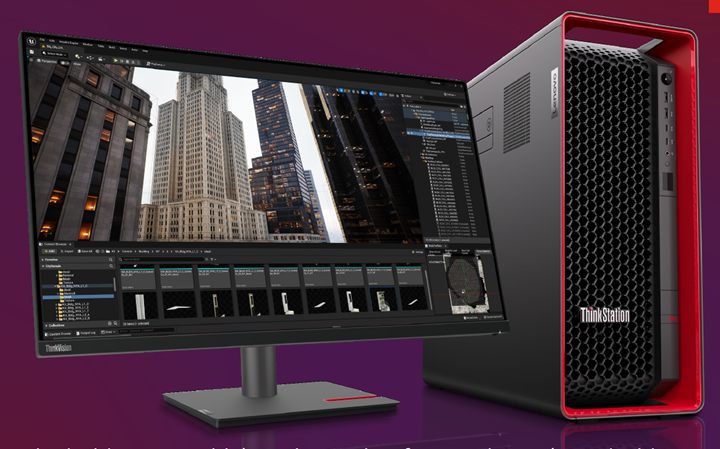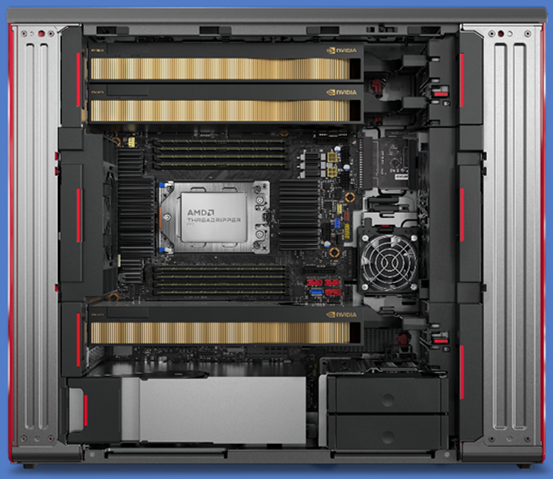Lenovo introduced the ThinkStation P8 tower workstation, which uses AMD’s Ryzen Threadripper Pro 7000 WX-Series processors and Nvidia’s RTX GPUs. The ThinkStation P8 inherits features from the P620, the first AMD Ryzen Threadripper Pro-powered workstation. Boasting of enhanced thermal design and a flexible Aston Martin-inspired chassis, Lenovo’s P8 caters to diverse sectors. It provides exceptional performance and scalability for complex workloads, from simulations to AI applications, with certifications, security, and support reinforcing its reliability.
What do we think? Lenovo took a chance with AMD when they brought out the P620 in March 2022. It paid off, and here they are again with the latest AMD Zen 4 Threadripper and an attractive chassis that can be freestanding or rack-mounted and accommodate up to three of Nvidia’s fat RTX AIBs.
ThinkStation P8 powered by AMD Ryzen Threadripper Pro 7000 WX-Series processors
Lenovo announced its new ThinkStation P8 tower workstation powered by AMD Ryzen Threadripper Pro 7000 WX-Series processors and Nvidia RTX GPUs. The new ThinkStation P8 builds on the success of the P620, which was the world’s first workstation powered by AMD Ryzen Threadripper Pro processors. The P8 tower features an enhanced thermal design in an Aston Martin-inspired chassis.
The P8 is powered by AMD’s Ryzen Threadripper Pro 7000 WX-Series 5nm Zen 4 processors with up to 96 cores and 192 threads. The rack-optimized chassis offers larger Platinum-rated power supply options to handle expansion capabilities. For example, it can accommodate up to three Nvidia RTX 6000 Ada Generation GPUs.
The evolution of workflows associated with data science and generative AI are becoming increasingly reliant on powerful CPU and GPU components. As datasets grow in size and complexity, AI professionals are having to balance workflow agility, time to insight, and expense efficiencies of cloud solutions, which are often cost-prohibitive at scale. Security and data governance are also concerns driving the need for more powerful compute in the hands of high-value, AI-focused employees.

The ThinkStation P8 workstation includes ISV certifications and supports Windows 11 and popular Linux operating systems. It features a range of storage and expansion capabilities and easy access and tool-less serviceability to provide futureproof scalability and quick replacement of many components.
The P8 workstation can accommodate up to seven M.2 PCIe Gen 4 SSDs with RAID support, or up to three HDDs for large-capacity storage, up to 2TB of DDR5 memory with octa-channel support, and seven PCIe slots including six PCI Gen 5 that deliver higher-speed connectivity, lower latency, and more expansion capability, and includes 10 Gigabit Ethernet onboard to virtually eliminate network bottlenecks.

ThinkStation P8 includes built-in hardware monitoring accessible through ThinkStation Diagnostics software, and Lenovo Performance Tuner comes with numerous profiles to optimize many ISV applications. The P8 also comes with Lenovo’s ThinkShield security offerings, which provide protection from BIOS to cloud. The workstation can be further managed through Lenovo TruScale, which simplifies procurement, deployment, and management of fully integrated IT solutions, all delivered as a service with a pay-as-you-go model.
The ThinkStation P8 will be available starting Q1 2024.